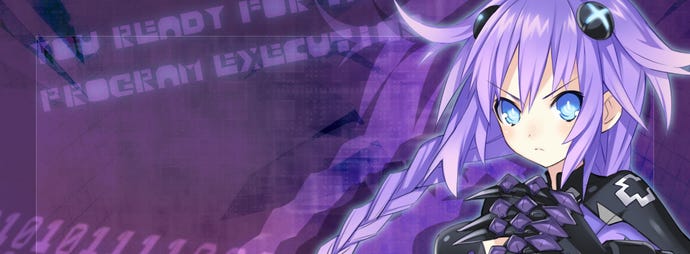JPgamer: Victory, After a Hundred Hours
Some eight months after its original release -- and 112 hours of gameplay later -- Gamindustri is safe once again. Pete shares some final thoughts on Hyperdimension Neptunia Victory.
This article first appeared on USgamer, a partner publication of VG247. Some content, such as this article, has been migrated to VG247 for posterity after USgamer's closure - but it has not been edited or further vetted by the VG247 team.
There are a lot of games out there where popular perception doesn't particularly line up with critical reception, but there are few better examples I can think of than Compile Heart's Hyperdimension Neptunia series.
Consistently panned by critics for a variety of reasons -- across the three games that have been released to date, their Metascores stand at 45, 53 and 54 respectively -- the series has nonetheless managed to find a significant enough audience both in its native Japan and in the West for Compile Heart to continue making them. In Japan, they've even spawned a spinoff anime series and a variety of merchandise; here in the West, meanwhile, publisher and localizer NIS America is clearly happy enough with each game's performance to continue bringing them to English-speaking territories, and online communities regarding all three games are always abuzz with active discussions about everything from where to find their numerous secrets to which character is everyone's favorite.
I've played all three games in the series now and genuinely enjoyed all of them massively. I can see where the criticisms come from -- all three games are extremely repetitive, technically flawed and awash in fanservicey moe imagery, childish boob jokes and other content that is not to everyone's taste -- but for me, personally, the candy-colored aesthetic, enjoyably fluffy story, eminently loveable characters and excellent translations have actually made them some of my most fondly regarded games of recent years.
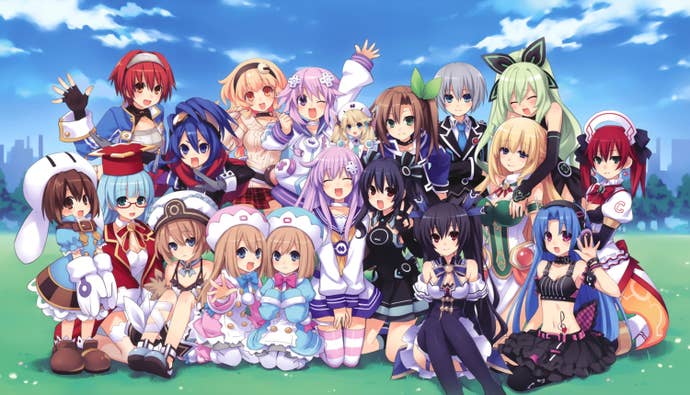
I completed the third game, Hyperdimension Neptunia Victory, this very week. Well, to be exact, I scored the Platinum trophy on it -- something that I only do for games that I really like. It took me 112 hours of gameplay in total, and I've been playing it off and on since April, interrupted along the way by two fairly lengthy RPGs that I was playing for review -- Time and Eternity and Tales of Xillia -- so I think I've got my money's worth. And I came away from it feeling not only very satisfied with the experience I'd had, but also that, as with many other recent Japanese RPGs, it was a lot more clever than people were giving it credit for.
Like previous installments of the series, Victory centers around the misadventures of Neptune, a ditzy, airheaded personification of Sega's vaporware Neptune console. She's joined by her regular companions Noire (a distinctly tsundere personification of the PlayStation brand), Blanc (a foul-mouthed, quick-to-anger personification of Nintendo) and Vert (a blonde-haired, blue-eyed, large-breasted personification of Microsoft's Xbox brand) along with her sister Nepgear (the technology-obsessed, constantly downtrodden, try-too-hard personification of Sega's handheld Game Gear), newcomer Plutia (the split-personality personification of Sega's Saturn successor the Pluto), and a few supporting characters depending on which of the game's three endings you're heading for.
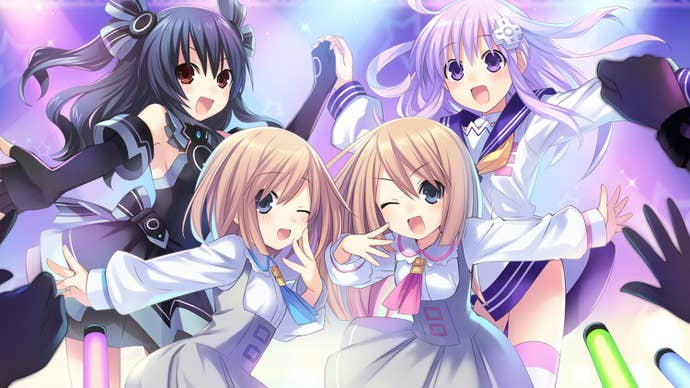
These characters, most of whom have been present since the inception of the series, are where some of the best humor comes from, since their personalities and representations are absolutely in keeping with their real-life counterparts. Neptune's airheadedness and unwillingness to knuckle down and focus on actually getting some work done mirrors Sega's struggles to remain relevant in the hardware race up until the Dreamcast era; Noire, conversely, is the exact opposite, working as hard as she possibly can and never being satisfied until she is absolutely, positively and completely the best in the world -- much like Sony's attempts to dominate the market with the various incarnations of the PlayStation. Blanc, meanwhile, is absolutely wonderful; having the appearance of a demure, quiet, shy girl but turning out to be by far the angriest person in the whole cast mirrors the contrast between Nintendo's family-friendly image and the ruthless business practices the company engaged in under Hiroshi Yamauchi. And as for Vert, while she may look like a token blonde-haired big-boobed bimbo, she's a textbook example of a common representation of "foreigners" -- specifically Americans -- in popular Japanese media such as anime and manga. With Neptune, Noire and Blanc all being based on Japanese systems, Vert's obvious "foreignness" in comparison makes perfect sense, as does her feeling enormously threatened when Peashy, the character who represents the rapidly growing PC games market, shows up.
Victory runs with these ideas even further by taking a wry, sidelong glance at the history of the games industry, with its narrative stretching from the NES vs Master System era right up to the end of the seventh generation. The girls' costumes for their powered up "Hard Drive Divinity" form change accordingly as the game progresses, too; Blanc, for example, begins the game in the red and white of the Famicom, progressing through the light gray of the Super Famicom, the dark gray of the N64, the deep purple of the GameCube and the brilliant white with glowing blue highlights of the Wii. Vert, meanwhile, begins in a rather revealing black-and-green number and eventually graduates to a beige-colored costume with glowing red lights all over it. (In the first game in the series, she was also rather prone to getting too hot and having to rest for a while, though this particular character trait has been toned down somewhat in the subsequent installments.)
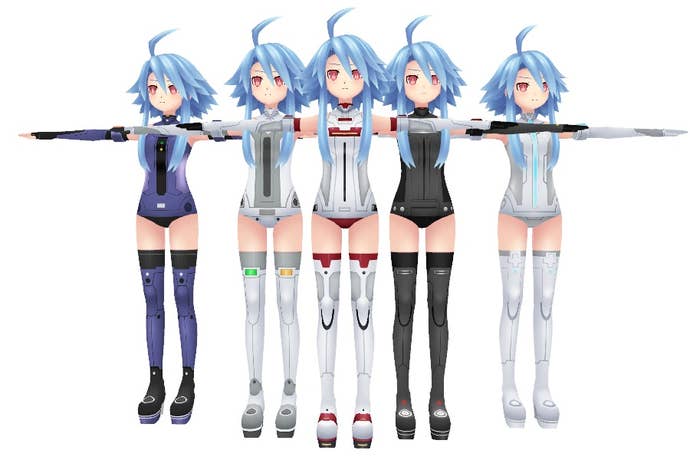
It's not just a visual change as the game progresses, though; the way these characters interact with one another changes over time, too. As goddesses (or, in the game's parlance, CPUs) of the setting of Gamindustri, the girls' various struggles mirror real-life things the games industry has had to deal with over the years -- rampant piracy; the rise of the PC as a viable gaming platform; concerns over whether or not video games are "good" for society as a whole. Indeed, the eventual revelation of the main villain's true identity is, I think, the only time I've ever played a game where the great industry crash of 1983 has been leveraged as a plot point in a fairly convincing manner.
Humor and references abound outside of the main plot, too: sidequests will often put in sly digs at well-known game franchises (one quest called "Negotiation Failed" sees you hired by a guy who just calls himself "Devil Summoner" to deal with a mythological beast he failed to tame, for example) and the enemies consist of sentient dating sims, Pac-Man ghosts and pipes from Mario among other, more conventional monsters. Even the repetitive nature of the game's dungeons could be interpreted as an oblique reference to Sega's own Phantasy Star Online, which constantly recycled the same environments with very slightly different layouts for its various quests.
And this isn't even getting into the series' trademark special attacks, which range from summoning a giant laser-spitting battleship with Keiji Inafune's face on it to an attack that consists entirely of Plutia throwing down her plush toy weapon -- whose various incarnations include references to everything from Dragon Quest to Gundam -- on the floor, then stamping on it repeatedly. (When she switches to her rather more dominatrix-like HDD alter-ego, however, the innocent and amusing stamping on a soft toy is replaced by the rather more sadistic grinding her heel into the enemy's nose with a look of pure glee on her face. You don't mess with Plutia.)
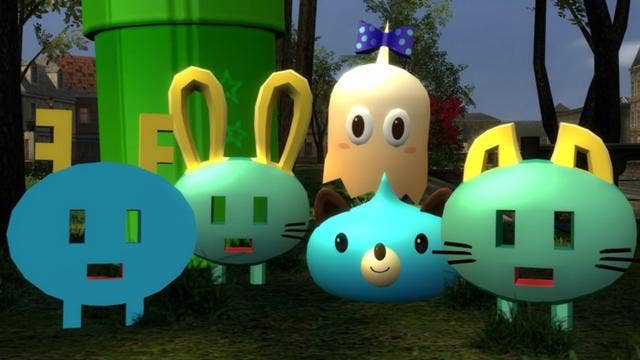
I could go on, but I'll restrain myself. I'm sure we've all come across games that just "resonate" with us, regardless of how the rest of the world seems to feel about them. For me, the Hyperdimension Neptunia series falls very much under that description; I certainly don't expect anyone to feel quite the same way as I do about these three peculiar, flawed little games and their impending Vita follow-ups and remakes, but I'll always love them, and, for me, they'll remain a highlight of my own personal gaming library.
